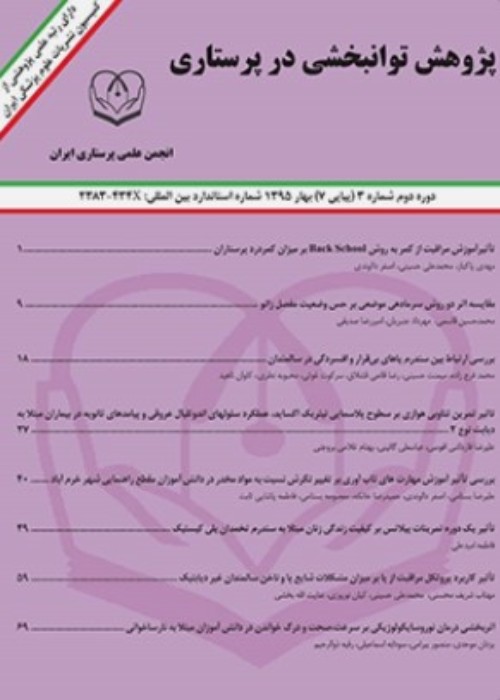The comparison of Emotional Quotient in blinds and low visions with normal sighted people in Shahroud welfare organization, 1392
Author(s):
Abstract:
Introduction
Blind people experience more problems about adaptive and diagnostic skills affected by society and environment encounters, and Studies in related to social and adaptive behaviors in blind children is limited in Iran and the results are conflicting. The aim of this study was comparing Emotional Quotient in blinds and low visions with normal sighted people in Shahroud city and tries to understand the impact of the disability on Emotional Quotient.Methods
This is a comparative cross-sectional study. 109 individuals (32 blind and low vision persons consisting the population of blinds in Shahroud welfare organization and 77 male and female healthy individuals of families from other disable groups) with convenient sampling method were selected. We used a reliable (Cronbach's alpha equal to 0/93) standardized 90 items Bar-on Emotional Quotient questionnaire in this study. Large fonts version of questionnaires were used for low vision group. Pearson correlation coefficient, independent t-test and ANCOVA tests were conducted for statistical analysis of data using SPSS software version 16.Results
The mean and standard deviation of Emotional Quotient in blind, low vision and healthy persons was 331.5±45 and 326.5±42, respectively. Although emotional Quotient scores were different between the two groups, but independent t-test showed no significant differences (P> 0/05). Emotional Quotient scores in two dimensions, Flexibility (p=0.035) and self-actualization (p=0.049) were significantly higher in blinds and low vision group. Control for confounding variables such as age, gender, marital status and education level conducted using analysis of covariance and results were not significant (P>0.05).Conclusion
Two dimensions of flexibility and self-actualization of emotional quotient scores in blinds and low visions in this study are significantly higher that could be due to long time experience living with disability and well adaptation with this condition and also is due to relatively high educational achievements in these subjects. It is recommended that emotional intelligence be utilized in this group for personal development purposes.Keywords:
Language:
Persian
Published:
Iranian Journal of Rehabilitation Research in Nursing, Volume:1 Issue: 1, 2014
Pages:
32 to 41
magiran.com/p1698925
دانلود و مطالعه متن این مقاله با یکی از روشهای زیر امکان پذیر است:
اشتراک شخصی
با عضویت و پرداخت آنلاین حق اشتراک یکساله به مبلغ 1,390,000ريال میتوانید 70 عنوان مطلب دانلود کنید!
اشتراک سازمانی
به کتابخانه دانشگاه یا محل کار خود پیشنهاد کنید تا اشتراک سازمانی این پایگاه را برای دسترسی نامحدود همه کاربران به متن مطالب تهیه نمایند!
توجه!
- حق عضویت دریافتی صرف حمایت از نشریات عضو و نگهداری، تکمیل و توسعه مگیران میشود.
- پرداخت حق اشتراک و دانلود مقالات اجازه بازنشر آن در سایر رسانههای چاپی و دیجیتال را به کاربر نمیدهد.
In order to view content subscription is required
Personal subscription
Subscribe magiran.com for 70 € euros via PayPal and download 70 articles during a year.
Organization subscription
Please contact us to subscribe your university or library for unlimited access!


